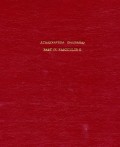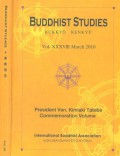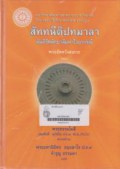Málavika and Agni·mitra
While the other works of Kali·dasa are populated by supernatural beings and larger-than-life people, “Málavika and Agni·mitra” derives its plot from history and features thoroughly mortal ch…
- ครั้งที่จัดทำ
- -
- ISBN/ISSN
- 9780814787021
- ลักษณะวัสดุ
- 346 pp.
- ชื่อชุด
- Clay Sanskrit library, 56.
- เลขหมู่
- -
How Úrvashi Was Won
How Úrvashi was Won (Vikramorvaśīya) is one of the three surviving plays by Kali·dasa (fifth century CE), universally acknowledged as the supreme poet in classical Sanskrit; like the other two …
- ครั้งที่จัดทำ
- -
- ISBN/ISSN
- 9780814741115
- ลักษณะวัสดุ
- 300 pp.
- ชื่อชุด
- Clay Sanskrit library, 48.
- เลขหมู่
- -
The Recognition of Shakúntala
The play Shakúntala was one of the first examples of Indian literature to be seen in Europe, first translated into English, and then into German. It attracted considerable attention (from Goethe, …
- ครั้งที่จัดทำ
- -
- ISBN/ISSN
- 9780814788158
- ลักษณะวัสดุ
- 419 pp.
- ชื่อชุด
- Clay Sanskrit library, 22.
- เลขหมู่
- -
Messenger Poems
Kali·dasa’s fifth-century CE “Cloud Messenger” is a beautiful and pure expression of an exiled lover’s love. That first messenger poem is imitated in the twelfth century in the “Wind Mes…
- ครั้งที่จัดทำ
- -
- ISBN/ISSN
- 9780814757147
- ลักษณะวัสดุ
- 293 pp.
- ชื่อชุด
- Clay Sanskrit library, 16.
- เลขหมู่
- -
The Birth of Kumára
This greatest of court epics describes events leading up to but not including the birth of Kumára (also known as Skanda or Karttikéya), the war god destined to defeat the demon Táraka. The god…
- ครั้งที่จัดทำ
- -
- ISBN/ISSN
- 9780814740088
- ลักษณะวัสดุ
- 360 pp.
- ชื่อชุด
- Clay Sanskrit library, 5.
- เลขหมู่
- -
The Raghuvamsa of Kalidasa
- ครั้งที่จัดทำ
- -
- ISBN/ISSN
- -
- ลักษณะวัสดุ
- 2 v. (liv, 1165 p.) : ill. ; 23 cm.
- ชื่อชุด
- Caukhambhā rājamātā granthamālā, no. 4.
- เลขหมู่
- -
- ครั้งที่จัดทำ
- -
- ISBN/ISSN
- -
- ลักษณะวัสดุ
- 2 v. (liv, 1165 p.) : ill. ; 23 cm.
- ชื่อชุด
- Caukhambhā rājamātā granthamālā, no. 4.
- เลขหมู่
- -





 Computer science, information & general works
Computer science, information & general works
 Philosophy & psychology
Philosophy & psychology
 Religion
Religion
 Social sciences
Social sciences
 Language
Language
 Pure Science
Pure Science
 Applied sciences
Applied sciences
 Arts & recreation
Arts & recreation
 Literature
Literature
 History & geography
History & geography